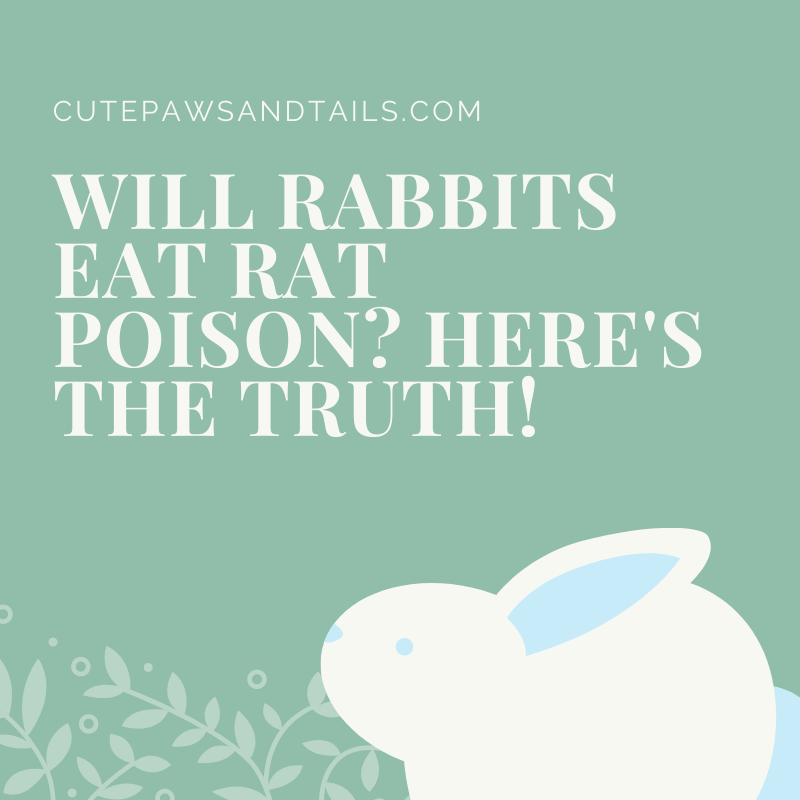Whether you have pet rabbits or the occasional local garden visitors, it’s only natural to worry about their safety. Will rabbits eat poison, anyways? If so, what can you do to stop them?
Unfortunately, the truth is that rabbits can and do eat poison, mistaking it as food. Worse, rabbits don’t vomit like you or I would if they ingest something toxic, so if you suspect poisoning then an immediate visit to the vert is critical!
Today, we’ll talk about what happens when a rabbit eats poison, common house and garden plants to watch out for, and what you can do to keep rabbits out of your garden if unsafe plants are growing there. Let’s discuss poison, rabbits, and what you need to know to keep them safe!
What happens when a rabbit eats poison?
When a rabbit eats poison, the effects depend on the poison itself so the results may vary quite a bit. Rat poison, for instance, is cumulative, so it builds up slowly in a rabbit’s system. This means that you cannot use rat poison in your house, as it may slowly poison your rabbit.
Poisons of this type are hard to detect in rabbits, as they cause internal problems such as the blood failing to clot. If you already have some rat poison in the house and your rabbit seems ill, then a vet checkup is going to be a very good idea at this time.
Aside from rat poison, a number of plants are toxic to rabbits so it is better to give you some of the symptoms to watch out for and we’ll follow up with those plants so that you may prepare to isolate or remove them from the environment. Symptoms of poisoning in rabbits may include:
- Lethargy/general weakness
- Hunched-down posture
- Vomiting
- Tenderness in the abdomen
- Seizures
- Diarrhea
- Loss of appetite
While poisoning may prove fatal, if caught early than most of the time the effects may be reversed, so if you see symptoms like these in your rabbit then you should schedule a vet visit right away!
Common house and garden plants that can poison rabbits
You might not know it, but a number of common household and garden plants are actually quite poisonous for rabbits. We’ll list some of these below and in the following section, we’ll give you an idea of how you may keep rabbits away from these plants to avoid accidental poisoning. Below are plants that are definitely toxic to rabbits:
- Rhubarb – Rhubarb is a common garden plant that is highly toxic to rabbits and it contains compounds called oxalates that may interfere with your rabbit’s digestion of calcium. Signs of ingestion include a swollen mouth and belly.
- Ivy – The leaves and berries of common ivy are quite toxic to rabbits and ingestion of the leaves or berries may result in twitching, paralysis, and possibly death.
- Avocados – Avocados contain a chemical called Persin, which may cause breathing problems in rabbits, so do not allow them to eat this as a snack as it is very toxic to rabbits.
- Fruit seeds and pips – Apple, apricot, plum, and peach pits contain small amounts of cyanide in them, so if you are feeding fruits to your rabbit then be sure to take out the seeds and pips first as these trace cyanide amounts build up slowly over time.
- Chocolate – Chocolate contains caffeine and theobromine, both of which are bad for many animals and this definitely includes rabbits. If you notice that your rabbit seems restless, is trembling, of has diarrhea and an open chocolate package is nearby then consult your vet immediately.
- Foxglove – Foxglove grows wild but it is also a popular garden plant, due to its lovely flowers. Unfortunately, these flowers are toxic to rabbits and may cause dehydration, trembling, and possibly cardiac issues so if you are growing these you’ll want to keep your rabbit away from your garden.
What can I do to keep rabbits away from poisonous plants in my garden?
Rabbits don’t like the smell of peppermint, so growing some peppermint plants in your garden may help to minimize their curiosity about what you are growing there. That said, there are also commercial products that can help, such as Liquid Fence Deer and Rabbit repellent.
With liquid fence, the scent works to keep them away, while the product itself is non-toxic to animals and plants as long as it is used properly.
In closing: Rabbits can get poisoned, so watch out for the symptoms
Today we’ve answered the question ‘will rabbits eat poison’ and as you can see, they can and sometimes do. Thankfully, a quick vet visit may often reverse the effects, so if you notice diarrhea, weakness, swelling, and especially any twitching in your rabbit then a quick vet visit is a very good idea.
With a little preparation with natural repellents like peppermint plants, peppermint oil, or commercial means like Liquid fence, you should be able to keep your rabbit out of your garden and houseplants so that they will stay happy and healthy!



